The Curious Incident of the Dog in the Night-time
Simon Stephens, Based on the Novel by Mark Haddon
San Francisco Playhouse

A boy of fifteen years, three months, three days can count from a fast moving train the exact number of trees on a hillside, of clouds in the sky, and of hues of green in the meadows passing by. He notes without hesitation that his neighbor is wearing “New Balance trainers with red laces” as he walks by; and he memorizes a map of London in order to find his way from Swindon in southwest England to a house at 451c Chapter Road, London NW2 5NG (where he has never been).
A young boy’s precision-oriented mind that can also prove complex, math problems comes to life visually and physically as the audience enters the world of his brain and all its electronic signaling while witnessing Simon Stephens’ multiple-award-winning play, The Curious Incident of the Dog in the Night-Time. What also spins, bumps, and bounces all over San Francisco Playhouse’s stage is a boy’s world of emotional chaos – a world where touch by other human beings is tortuous; where loud noises, bright lights, or crowds can suddenly cause uncontrollable seizures and/or screams; and where retreat into absolute silence amid the noises of his surroundings is sometimes his only way to cope with his autism spectrum disorder.
With a touch that has proven time and again in past productions to be as golden as Midas’, Susi Damilano has reached yet another peak in her career directing an electrically charged, beautifully conceived, and thoroughly heartwarming The Curious Incident of the Dog in the Night-Time. With a cast that is to a person incredibly talented and a creative team that soars with their ingenuous and skilled touches galore, San Francisco Playhouse once again has a hit on its hands that probably will see weeks of sold-out performances as word spreads from the run’s initial, standing ovation audiences.
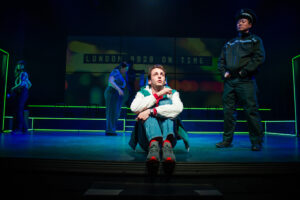
Seven minutes after midnight, Christopher Boone somehow finds himself in Mrs. Shearson’s backyard next to her dog, Wellington, who is very dead with a pitchfork through his body. At first wrongly accused as the perpetrator, Christopher “makes it a project” to find out who is the murderer. His meticulously precise mind works over-time to hunt down in his neighborhood who did the deed, even as his father forbids him to get involved. His search for truth leads him to a shocking discovery about his own father, Ed, with whom he has lived alone since told two years before that his mother, Judy, had died in the hospital of a sudden heart problem. That revelation sends him off on a cross-country scavenger hunt with few clues how to get his destination while at the same time, he is still determined to take in just three days a difficult math exam in order to forge an unlikely path toward university study.
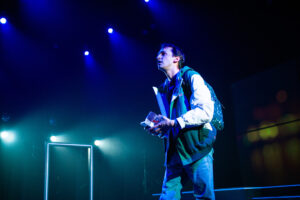
For any other teenage boy, a story about mysteries to be unraveled by his detective work might take on the flavor of a fairly genteel, Hardy Boys book. But for Christopher’s determined sleuthing, discoveries must be made amidst sounds that suddenly scream monstrously, lights that pop and flash to the point of hurting, and people that somehow appear in closed-in, intrusive, scary mobs. Through the inspired, inventive direction of Damilano, the combined ordered and random thought patterns of Christopher’s mind play out before us along with the full gamut of his many emotional states. All along the way, the playwright and director together never let us forget that at the heart of it all, Christopher is just another teenager who has conflicts with his parents, feels misunderstood, has lofty ambitions, and is sometimes ferociously stubborn. And this particular teen is also immensely brave.
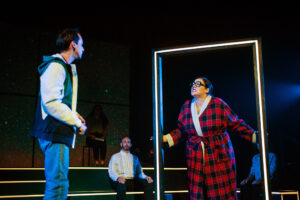
As Christopher, Brendan Looney is breathtakingly magnificent. Diagnosed as an adult as autistic, Looney brings an understanding and appreciation for Christopher’s differences from most other people around him that imbues his performance with a sense of depth, insight, and empathy that is jaw-dropping.
The sound journey his voice alone takes is phenomenal as he rigorously and methodically speaks each individual word with exacting care in tones that ride up and down the vocal scale. And yet, there is always an everyday, teenage boy that can be heard in each word and phrase.
Physically, his Christopher at times jerks and twists uncontrollably and at other times, becomes a frozen statue that cannot be moved. He may walk in almost a soldier’s goose-step march or may suddenly be like a tornado on stage. His Christopher pooh-poohs theater as an avenue for storytelling; yet Brendan Looney’s live actions, vocals, and expressions fill the stage with a story that could never be told in the same way on the printed page.
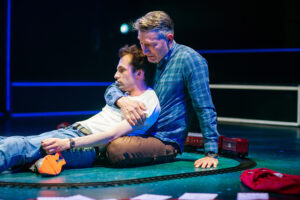
As Christopher’s father Ed, Mark P. Robinson provides a heart-wrenching portrayal of the frustrations and fears, the maddening and not always correct choices, and deep love tinged sometimes by absolute anger that any dad of a special-needs boy must experience. Ed is a dad with burdens heavier than most parents must bear, his own voice resounding with the desperate need he has to love and be loved by a son who has come to distrust him and freaks out when in the same room with him. Robinson’s expressions of desperation for the trust now gone are enough to break every parent’s heart who sits in the audience because we have all been there to some extent at some time.
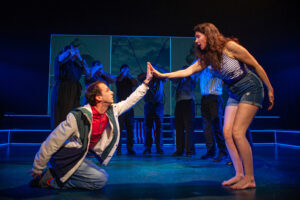
Also hungry for the affection of a son is Judy, the mother not as dead as the dad has led his son to believe. Liz Sklar provides several of the evening’s more touching moments as she struggles to understand, to help, and to connect to a son who wants to be with her but not near enough to receive a gentle kiss on the cheek.

As Siobhan, Christopher’s paraprofessional mentor and guide at school, Sophia Alawi also serves as the play’s ongoing narrator, often reading from the book that Christopher is writing to detail his detective work. With a steady stream of encouragement, her Siobhan helps both Christopher and us as audience figure out how the world around him operates and how he may be able to work his way through it a way that works for him. In many ways, she often expresses in her voice and eyes the inner feelings that Christopher does not know how to show.
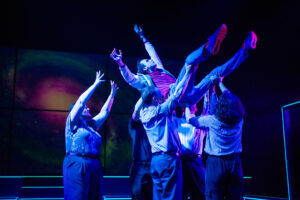
The wildly precise imagination of a teen who wants to be an astronaut, the probing curiosity of where exactly is God, and the start-stop pandemonium of an autistic boy’s always-surprising world of constant changes are only a few examples of the physical bearings of Christopher’s existence that come to life through the movement direction of Bridgette Loriaux. Six cast members individually, in small groups, and as a whole become partners with Christopher in creating intricate encounters — both real and those in his head – whereby the boy is bombarded by rushing people in a train station; smushed against all their heads in a small, space capsule; supported by multiple, coordinated bodies in a sudden lean or leap; or finding his way in a bedroom’s clutter .as he crawls under and over bodies serving as furniture. The same six often amplify the moaning distress, the frenzied excitement, or a terrified moment Christopher is experiencing through their own voices, stomping, or collective movements. Through them, we experience viscerally the fast-paced, emotion-packed mind that Christopher cannot always express outwardly himself.
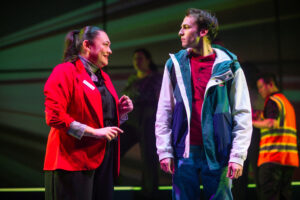
These six Voices also each take on multiple characters. Catherine Luedtke is the highly upset Mrs. Shearson whose dead dog and divorced husband provide much fodder for her expressed anger and frustration; she is also hilarious as the talking head of Christopher’s school, Mrs. Gascoyne. Laura Domingo is a sympathetic neighbor, Mrs. Alexander, who spills the beans over a cup of tea with Christopher that leads him to solve a second mystery beyond the dead dog. Whit K. Lee plays various, understanding yet firm police officers while Cassidy Brown is a Roger Shearson who chugs beers while not being all too happy to see who suddenly shows up on his doorstep. All play other minor roles when not part of the watching and reacting Voices as do Renee Rogoff and Wiley Naman Strasser.
Bill English has created a three-sided, two-stepped arena that provides the edging for Christian Mejia’s LED lights that help define and illustrate the workings of Christopher’s mind, the paths of his movements, and the emotions of his delights and fears. Normal sounds that erupt into explosive fireworks for a boy quickly scared by them becomes the part of the pallet for James Ard’s extraordinary sound design. The imaginations of his mind, the calculation’s of his mathematical genius, and the surroundings of his journeys all are illustrated through the richly colored and highly imaginative projections displayed in a full backstage of panels, designed by Sarah Phykitt. Amy Benjamin’s properties (dead dog, playful pet rat and much more) as well as the excellent results of Kimberly Mohne Hill’s dialect coaching of British accents round out a creative team’s extraordinary efforts.
The Curious Incident of the Dog in the Night-Time is an enthralling adventure that invites audience members to go along for a wild ride with a boy intent on accomplishing several, unswerving missions: solve a mystery, find his mother, pass a math test. That this particular boy has a mind unique and special often defined by a label others call ‘autistic’ is of little care or consequence to him. What we learn in San Francisco Playhouse’s must-see production is that Christopher is just an exceptional teenager with clear goals, deep passions, and stubborn determination – all keys to a future where he just might succeed.
One final note, do not leave your seat after the final curtain call. You do not want to miss a four-minute epilogue involving the entire cast with Christopher at center stage and with a creative team and director showing yet again their artistic prowess.
Rating: 5 E, MUST-SEE
A Theatre Eddys Best Bet Production
The Curious Incident of the Dog in the Night-Time continues through June 21, 2025, in a two-hour, thirty-minute (with one intermission) production by San Francisco Playhouse, 450 Post Street, San Francisco. Tickets are available online at www.sfplayhouse.org or by phone at 415-677-9596.
Photo Credits: Jessica Palopoli

Leave a Reply